一高考代词考点
高考英语语法专题复习代词
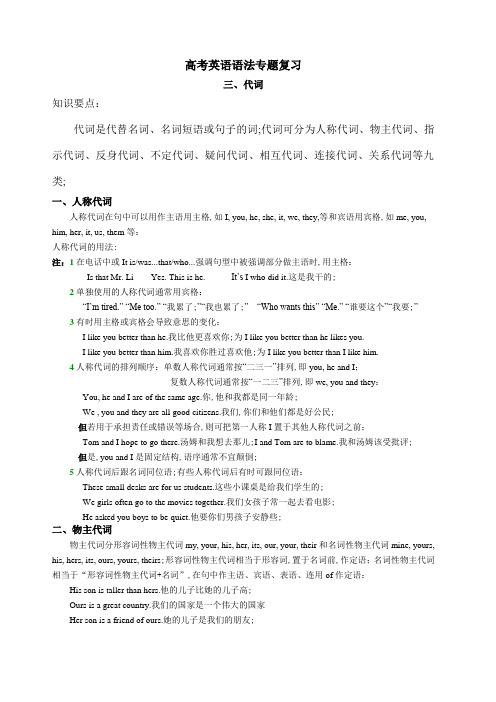
高考英语语法专题复习三、代词知识要点:代词是代替名词、名词短语或句子的词;代词可分为人称代词、物主代词、指示代词、反身代词、不定代词、疑问代词、相互代词、连接代词、关系代词等九类;一、人称代词人称代词在句中可以用作主语用主格,如I, you, he, she, it, we, they,等和宾语用宾格,如me, you, him, her, it, us, them等:人称代词的用法:注:1在电话中或It is/was...that/who...强调句型中被强调部分做主语时,用主格:---Is that Mr. Li ---Yes. This is he. It’s I who did it.这是我干的;2单独使用的人称代词通常用宾格:“I’m tired.” “Me too.” “我累了;”“我也累了;”“Who wants this” “Me.” “谁要这个”“我要;”3有时用主格或宾格会导致意思的变化:I like you better than he.我比他更喜欢你;为I like you better than he likes you.I like you better than him.我喜欢你胜过喜欢他;为I like you better than I like him.4人称代词的排列顺序:单数人称代词通常按“二三一”排列,即you, he and I;复数人称代词通常按“一二三”排列,即we, you and they:You, he and I are of the same age.你,他和我都是同一年龄;We , you and they are all good citizens.我们,你们和他们都是好公民;但若用于承担责任或错误等场合,则可把第一人称I置于其他人称代词之前:Tom and I hope to go there.汤姆和我想去那儿;I and Tom are to blame.我和汤姆该受批评;但是,you and I是固定结构,语序通常不宜颠倒;5人称代词后跟名词同位语;有些人称代词后有时可跟同位语:These small desks are for us students.这些小课桌是给我们学生的;We girls often go to the movies together.我们女孩子常一起去看电影;He asked you boys to be quiet.他要你们男孩子安静些;二、物主代词物主代词分形容词性物主代词my, your, his, her, its, our, your, their和名词性物主代词mine, yours, his, hers, its, ours, yours, theirs;形容词性物主代词相当于形容词,置于名词前,作定语;名词性物主代词相当于“形容词性物主代词+名词”,在句中作主语、宾语、表语、连用of作定语:His son is taller than hers.他的儿子比她的儿子高;Ours is a great country.我们的国家是一个伟大的国家Her son is a friend of ours.她的儿子是我们的朋友;This is your pen. Mine is in the box.这是你的铅笔,我的在铅笔盒里;注:1 a friend of mine ours, yours, hers, his, theirs结构2 物主代词与own连用;表强调;也可用of one’s own置于名词后作定语:Mind your own business.别管闲事;I saw it with my own eyes.那是我亲眼看到的;I hope to have a room of my own. / I hope to have my own house.我希望有自己的房子;三、指示代词指示代词是用来指代或标记人或事物的代词,表示“这个,这些”“那个,那些”;在句中可作主语、宾语、表语、定语;单数:this, that;复数:these, those;为了方便学习将such,so也归于此类;I like these and he likes those.我喜欢这些,他喜欢那些;What I want to say is this.我想说的就是这点;注:1 指示代词用作主语和定语时,可指人或物;用作宾语和表语时,只指物;如:This is my father. 作主语,指人Do you know this作宾语,指物,译为“你知道这个情况吗2 刚提到的或已经完成的事情时用that,但是若要指下文将要发生或将要提到的事情通常用this:She married Jim, and that surprised me.她嫁给了吉姆,这使我感到很吃惊;I want to know this: Is he healthy我想知道这一点:他是否很健康;3 在打电话时,通常用this指自己,用that指对方:Hello. This is Jim. Is that John喂,我是吉姆,你是约翰吗4 such指代前面所述的这样的人或事;如:Such is Albert Einstein, a famous physicist, but a simple man. 这就是艾尔伯特,爱因斯坦,......5 so代替一个句子或短语表达的事情;a.在believe,expect,suppose,imagine,think等词后用so代替前文观点;表肯定、否定=not均可;b. 用于表示肯定的hope,I’m afraid后,代替前文提出的观点;四、反身代词反身代词是oneself根据所指词的人称、性别、单复数等变化的词单数:myself, yourself,himself, herself, itself, 复数:ourselves, yourselves, themselves,在句中可作宾语、表语、同位语,不能作主语; 注:1用作同位语加强被修饰词的语气,紧放在被修饰名词后,或句末:The box itself is not so heavy.箱子本身并不重;You yourself said so. / You said so yourself.你自己是这样说的;2用作宾语动词或for,of, in, by, to等介词的宾语:She could not make herself understood.她不能使别人听懂她的话;You’ll have to see if he has come for yourself. for one self 亲自,为自己The computer may shut off of itself. of oneself 自动的You shouldn’t leave the child at home by herself. b y oneself 独自,单独Jim isn’t bad in himself, but he likes playing tricks on others. in one self 本身He likes a table to himself. to oneself 独自占用3 用作表语:有时用于be, feel, seem, look等后作表语表示身体或精神处于正常状态:The poor boy was myself.那个可怜的孩子就是我自己;The ones who really want it are ourselves.真正想要它的是我们自己;I'm not quite myself these days.我近来身体不大舒服;I'll be myself again in no time.我过一会儿就会好的;4 含有反身代词的动词短语:devote oneself to=be devoted to 专心于;lose oneself=be lost in 迷失;seat oneself= be seated 坐下; express oneself 表达某人的思想; say for oneself 为自己找借口;say to oneself 心想; talkto oneself 自言自语; feel oneself 觉得正常; come to oneself 苏醒;五、疑问代词疑问代词包括who, whom, whose,which, what,在句中可用作主语、表语、宾语、定语等:1、who与whom的用法:前者为主格,用作主语、宾语,后者为宾格,用作宾语;Who spoke at the meeting Whom are you talking about口语中或作宾语的whom位于句首时,通常可用who代替,但whom前有介词时除外:Whom is the letter from2、whose的用法:表示“谁的”,既可用于名词前作定语,也可单独使用;在句中作主、宾、表、定语;Whose is better, yours or hers作主语Whose do you love better, yours or hers作宾语Tom has already taken his bag is this作表语Whose bag do you like作定语3、what和which的用法:有选择范围时,多用which;无选择范围或不明确时,多用what;拓展:what的习惯用法:1 What...for... 和What for 用于询问原因和目的;---What did you put it into the soup for --- It would improve the taste.你为什么...---I’m going to the grocery store. ---What for We still have enough food in the apartment.为何啊(2)What if...表示假设、建议、征求意见或疑虑;What if it rains while we are on the way(3)What do you mean by...表示愤怒、不满等情绪;What do you mean by shutting the door so loudly(4)What/How about...用于征求对方意见、询问对方的情况;(5)疑问词what构成的固定搭配;So what那又怎么样呢表示不感兴趣或认为不重要What next店员用语还要什么Guess what你猜怎么着用于引起他人的注意What can I do for you你要买借什么4、what和who的区别:一般来说;what问职业、地位等,who问姓名或关系等:Who is he他是谁What is he他是干什么的六、相互代词相互代词只有each other和one another,它们在句中通常只用作宾语:We should help each other.我们应该互相帮助;They respect one another.他们互相尊重对方;The sea and the sky seem to melt into each other.大海和蓝天似乎融为一体;注:1相互代词在句中通常只用作宾语,不可作主语,所以以相互代词为宾语的句子不能变为被动语态;2不要将相互代词误认为是副词,将其用作状语,如可说talk to each other,但不能说talk each other;3相互代词可以有所有格形式:The students borrowed each other's notes.学生们互相借笔记;4有时可分开用:We each know what the other thinks.我们都知道对方的想法;七、不定代词1.不定代词概说;英语的不定代词有all, each, both, either, neither, one, none, little, few, many, much, other, another, some, any, no,few,little, both, enough, every等,以及由some, any, no和every构成的合成代词即somebody, anyone, nothing等;在这些不定代词中,多数都能作主语、宾语、表语或定语,但是代词none以及由some, any, no和every构成的合成代词只能作主语、宾语或表语,不能作定语,而no和every则只用作定语;2.指两者和三者的不定代词;有些不定代词用于指两者如both, either, neither,有的不定代词用于指三者如all, any, none, every,注意不要弄混:Both of my parents are doctors.我的父母都是医生;All of the students are interested in it.所有的学生对此都很感兴趣;There are trees on any side of the square.广场的每一边都种有树;He has two sons, neither of whom is rich.他有两个儿子,都不富有;He has three sons, none of whom is rich.他有三个儿子,都不富有;注:each可用于两者、三者或三者以上,而every只用于三者或三者以上,因此用于两者时只能用each,不能用every;如不能说There are trees on every side of the road.3.复合不定代词的用法特点;复合不定代词包括something, somebody, someone, anything, anybody, anyone, nothing, nobody, no one, everything, everybody, everyone等;它们在句中可用作主语、宾语或表语,但不能用作定语;something, someone等和anything, anyone等的区别与some和any的区别一样,前者一般用于肯定句,后者一般用于否定句、疑问句或条件句参见any & some;具体使用时应注意以下几点:1复合不定代词受定语修饰时,定语应放在它们后面:There is nothing wrong with the radio.这收音机没有毛病;Have you seen anyone anybody famous你见过名人吗2指人的复合不定代词若用作主语,其谓语动词一般用单数,相应的人称代词和物主代词也用单数he, him, his 不一定指男性;但在非正式文体中常用复数代词they, them, their:Everyone knows this, doesn't he don't they人人都知道这一点,不是吗If anybody anyone comes, ask him them to wait.要是有人来,让他等着;3指事物的复合不定代词若用作主语,谓语动词只能用单数,相应的人称代词也只能用it,而不用they:Everything is ready, isn't it一切都准备好了,是吗4anyone, everyone等只能指人,不能指物,且其后一般不接of短语;若是指物或后接of短语,可用any one, every one 分开写:any one of the boys books孩子们书当中的任何一个本every one of the students schools每一个学生一所学校4.是any not还是not any;按英语习惯,any以及含有any的复合不定代词用于否定句时,它只能出现在否定词之后,而不能在否定词之前:误:Any one doesn't know how to do it.正:No one knows how to do it.任何人都不知道如何做它;误:Anybody Anyone cannot do it.正:Nobody No one can do it.这事谁也干不了;误:Anything cannot prevent me from going.正:Nothing can prevent me from going.什么也不能阻挡我去;5.不定代词与部分否定;不定代词all, both, every等与not连用时构成部分否定;若要表示完全否定,则需换用none, neither, no one等;比较:All of the students like the novel.所有这些学生都喜欢这本小说;Not all of the students like the novel.并不是所有这些学生都喜欢这本小说;All of the students don’t like the novel.并不是所有这些学生都喜欢这本小说;None of the students like the novel.这些学生当中没有一个喜欢这本小说;6.all, both, each等用作同位语;若用作主语同位语,主语可以是名词或代词;若用作宾语等其他成分的同位语,则宾语等成分必须是人称代词,而不能是名词:We have all read it.我们都读过他;all修饰的主语是代词The villages have all been destroyed.村庄都被毁了;all修饰的主语是名词They told us all to wait there.他叫我们都在那儿等;all修饰的宾语是代词但不能说:They told the men all to wait there. all修饰的宾语是名词不是代词7.so little与such little的区别;用so little还是such little取决于little的意思:若表示数量方面的“少”,则用so little;若表示形状体积的“小”,则用such little:He has so little time for reading.他读书的时间少得可怜;I've never seen such little boxes.我从未见过那样小的盒子;8.some与any的用法区别;一般说来,some用于肯定句中,any用于否定句和疑问句中;但是,在表示请求、邀请或征求意见的句子中,通常要用some而不用any:Would you like some cake吃点蛋糕吗Why not buy some bread为什么不买些面包呢Shall I get some chalk for you要我帮你拿些粉笔来吗注:any有时也用于肯定句中,此时表示“任何”:Any colour will do.任何颜色都行;Come any day you like.随便哪天来都可以;9.many与much的用法区别;两者都表示“许多”,但many修饰或代替可数名词复数,与few少数相对;而much用来修饰或代替不可数名词单数,与little少量相对;在口语中两者主要用于非肯定句中:Did you see many people there你在那儿看见许多人了吗We don't have much time.我们没有许多时间;在肯定句中,一般用a lot of, lots of, plenty of等代之;但在正式文体中有时也用于肯定句中;另外,若用作主语或主语的定语,或其前有how, too, as, so, a good, a great等修饰,也可用于肯定句中:Many of us left early.我们有许多人离开得很早;Much work has been done.许多工作都已经做了;You've given me too much.你已给我太多了;Take as many much as you want.你要多少拿多少;I asked her a great many questions.我问了她许多问题;10.few, a few与little, a little的用法区别;1few和a few后接可数名词的复数形式;few表示数量很少或几乎没有,强调“少”,含有否定意义;a few表示数量虽然少但毕竟还有,强调“有”,含有肯定意义:It is very difficult, and few people understand it.它很难,没有几个人能懂;It is very difficult, but a few people understand it.他虽难,但是有些人懂;2little和a little之后接不可数名词,其区别跟few和a few之间的区别相似:Unfortunately, I had little money on me.很不巧,我身上没带什么钱;Fortunately, I had a little money on me.幸好我身上带着一点钱;11.other, the other, another与others的用法区别:这些不定代词不仅在含义上有单复数之分,而且在用法上有泛指无the和特指有the之别;其用法区别可归纳如下:1指单数时,若泛指用another,若特指用the other:Give me another one.另外给我一个;Shut the other eye, please.请把另一只眼睛也闭上;2指复数时,若泛指用other后接复数名词,若特指用the other后接复数名词:There are other ways of doing it.做这事还有其他的办法;Where have the other students gone其他学生都到哪里去了3others永远表示复数意义且其后不能再接名词;其用法大致相当于“other+复数名词”,同样地the others大致相当于“the other+复数名词”:Other people Others may not think that way.别的人可能不这样想;He is cleverer than the others the other students in her class.他比班上其他学生聪明;4another一般只能表单数,且其后接名词也只能接单数名词;但是若其后有数词或few修饰时,则也可接复数名词:We need another few chairs.我们还需要几把椅子;In another two weeks it'll be finished.再过两个星期就可做完了;5与some对比使用时,用others此时与some同义:Some say yes, and others say no.有人说对,有人说不对;12.不定代词与语境考题;不定代词是高考的常考考点,有的不定代词考题出得比较灵活,不能死套规则,要注意结合语境来理解:1“Is ____ here” “No, Bob and Tim have asked for leave.”A. anybodyB. everybodyC. somebodyD. nobody若只是从表面来看,填空句是个疑问句,可能会误选A;但其实此题最佳答案应选B,因为下文的答句说“只有Bob和Tim请假了”,这说明问句是在查人数,故用Is everybody here 大家都到齐了吗2I agree with most of what you said, but I don't agree with _____.A. everythingB. anythingC. somethingD. nothing此句若从表面看,有可能误选B,因为填空句为否定句;但实际上最佳答案为A,因为上文说“我同意他说的大部分内容”,这与下文的but I don’t agree with everything但并不是同意他说的所有内容完全相符;3“Do you have _____ at home now, Mary” “No, we still have to get some fruit and tea.”A. somethingB. anythingC. everythingD. nothing答案选C,句意为“玛丽,现在家里东西都准备齐了吗”“还没有,我们还要买些水果和茶;”4“If you want a necklace, I’ll buy one for you at once.” “Oh, no. A necklace is not _____ that I need most. A. anythingB. somethingC. nothingD. everything此题容易误选A,机械地认为:something用于肯定句,anything用于否定句或疑问句;但是,此题的最佳答案是B,something在此的意思不是“某种东西”,而是指“那种东西”或“这种东西”,即心中最想要的那种东西相当于the thing;。
高考英语代词在英语单项选择中的8个考点

高考英语代词在单项填空中的8个热点考点1 人称代词宾格活用下列情况也用宾格:①在be后作表语。
—Who is it? —It’s me.②在单独使用或带not的简略回答中。
如:—Who broke the cup? —Me! (Not me!)③在感叹疑问句中做主语,以引起强调。
如:—Y ou can tell him. —你可以告诉他。
—Me tell him? Not likely!④当前面有形容词修饰:--He’s got to repay the money —poor him.考点2指示代词的用法指示词有this, that, these, those等。
注意以下4点:(1) this, these是时间或空间上的“近指”,that, those是时间或空间上的“远指”,(2) 指上文提到的事一般用that,有时也用this,指下文的事只能用this。
(3) 打电话时,用this来介绍自己,用that来问对方,不用I或you。
(4) this和that还可表示程度,意为“如此,那么”,相当于so,作状语。
考点3 表示两者和多者的不定代词的比较1. 表示两者“都”用both,表示两者“都不”用neither; not…. either,表示两者中的“任一”用either。
Not both….部分否定“并非两个都”;2. 表示多者“都”用all,表示多者“都不”用none,not … any表示多者中的“任一”用any。
not all…部分否定“并非所有都….”;3. none可指人或物,一般要接表示范围的of短语,可回答how many;而no one 只指人。
不能接of短语,可回答who考点4 some, any的用法辨析表示“一些”,一般说来,肯定句中some,否定句中用any;但在表示请求、建议、劝请或希望对方作肯定回答的疑问句中用some。
另外,any 有时也用于肯定句中,表示“任何”。
高考英语语法专攻-《代词》-考点归纳+针对性练习
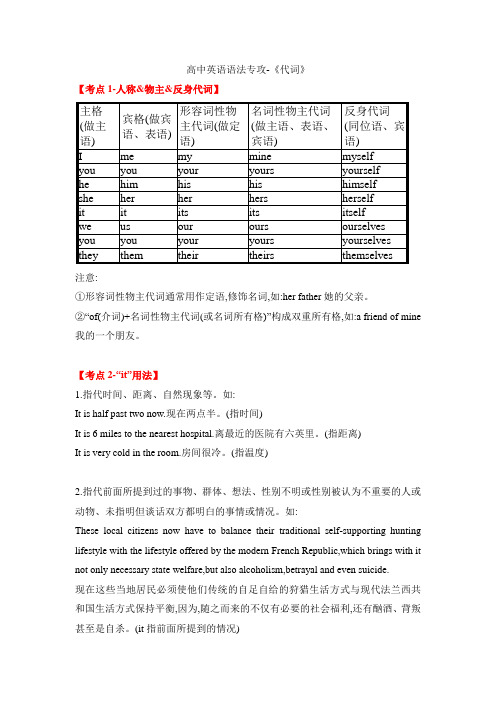
高中英语语法专攻-《代词》【考点1-人称&物主&反身代词】注意:①形容词性物主代词通常用作定语,修饰名词,如:her father她的父亲。
②“of(介词)+名词性物主代词(或名词所有格)”构成双重所有格,如:a friend of mine 我的一个朋友。
【考点2-“it”用法】1.指代时间、距离、自然现象等。
如:It is half past two now.现在两点半。
(指时间)It is 6 miles to the nearest hospital.离最近的医院有六英里。
(指距离)It is very cold in the room.房间很冷。
(指温度)2.指代前面所提到过的事物、群体、想法、性别不明或性别被认为不重要的人或动物、未指明但谈话双方都明白的事情或情况。
如:These local citizens now have to balance their traditional self-supporting hunting lifestyle with the lifestyle offered by the modern French Republic,which brings with it not only necessary state welfare,but also alcoholism,betrayal and even suicide.现在这些当地居民必须使他们传统的自足自给的狩猎生活方式与现代法兰西共和国生活方式保持平衡,因为,随之而来的不仅有必要的社会福利,还有酗酒、背叛甚至是自杀。
(it指前面所提到的情况)—Who’s that at the door?—It is the milkman.——门口那人是谁?——是送奶工。
(it指代性别不明或性别被认为不重要的人)—I’ve broken a plate.我打碎了一个盘子。
—It(=Breaking the plate) doesn’t matter.没关系。
高考英语代词知识点总结

高考英语代词知识点总结在高考英语中,代词是一个非常重要的语法知识点。
代词在句子中可以替代名词,起到简化句子结构、避免重复的作用。
本文将从不同角度总结高考英语中的代词知识点。
一、人称代词人称代词是用来代替人的名词的词语。
在高考英语中,常见的人称代词有I、you、he、she、we、they等。
在使用人称代词时需要注意其主格和宾格的区别。
主格用于做主语或表语,而宾格则用于做动词或介词的宾语。
例如:I am a student. (主格)She is taller than me. (宾格)除了区分主格和宾格之外,人称代词还有复数形式。
例如:we代表“我们”,they代表“他们”。
二、物主代词物主代词用来表示所属关系,包括形容词性物主代词和名词性物主代词。
形容词性物主代词位于名词前面修饰名词,而名词性物主代词则作为名词的替代词使用。
例如:This is my book. (形容词性物主代词)The red one is mine. (名词性物主代词)在使用物主代词时,需要根据名词的单复数和所有格进行变化。
例如,单数名词后加's,复数名词只加'。
三、反身代词反身代词用来指示动作的承受者与动作的发出者是同一个人。
常见的反身代词有myself、yourself、himself、herself、ourselves、themselves等。
例如:He hurt himself while playing football. (他在踢足球时受伤了)另外,反身代词可以用来强调主语:I myself will finish the task. (我自己会完成这个任务)四、指示代词指示代词用来指示人或物的位置、距离和数量等信息。
常用的指示代词有this、that、these、those等。
例如:This is my bag. (这是我的包)Those are my friends. (那些是我的朋友)指示代词还可以与名词连用来修饰名词,表示特指。
高考英语代词(一)解题方法和技巧及练习题

高考英语代词(一)解题方法和技巧及练习题一、单项选择代词1.-When shall we go to see the movie The Hunger Games together?-Make it ________ day you like; it's all the same to me.A.one B.any C.another D.some【答案】B【解析】试题分析:考查形容词辨析。
本句中的any意为“任意一个”,another另外一个;some一些;one一个;句意:—我们什么时候一起去看《饥饿游戏》这部电影啊?—你喜欢的随便那一天都行,我都没关系的。
根据句意可知使用any day,表示任意一天都可以。
故B正确。
【名师点睛】本题要特别注意any意为“任意一个....”,语气很强烈;another作形容词时,是指在原有的基础上再加一(些),表示“再一(些)”或“另外一个(些)”的意思,在心理上至少有三个.another还可作代词,意思与作形容词时一样.它前面不能加任何冠词,后面也不能加s【举一反三】The medicine is on sale everywhere. You can get it at _______ chemist's.A. otherB. someC. anotherD. any〖答案〗D试题分析:考查代词:A. other其他,B. some一些,C. another另一个,D. any任何一个,句意:这个药到处都在卖,你可以到任何一家药店买到它。
选D。
考点:考查形容词辨析2.If I have ever feared death before, it was ______ compared to how I felt as the roller coaster that moved faster and faster.A.anything B.something C.nothing D.everything【答案】C【解析】考查代词。
高考代词知识点梳理
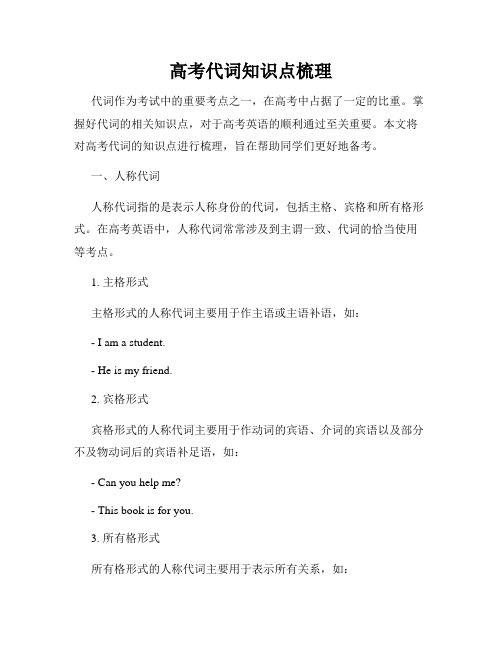
高考代词知识点梳理代词作为考试中的重要考点之一,在高考中占据了一定的比重。
掌握好代词的相关知识点,对于高考英语的顺利通过至关重要。
本文将对高考代词的知识点进行梳理,旨在帮助同学们更好地备考。
一、人称代词人称代词指的是表示人称身份的代词,包括主格、宾格和所有格形式。
在高考英语中,人称代词常常涉及到主谓一致、代词的恰当使用等考点。
1. 主格形式主格形式的人称代词主要用于作主语或主语补语,如:- I am a student.- He is my friend.2. 宾格形式宾格形式的人称代词主要用于作动词的宾语、介词的宾语以及部分不及物动词后的宾语补足语,如:- Can you help me?- This book is for you.3. 所有格形式所有格形式的人称代词主要用于表示所有关系,如:- This is my book.- Is that your pencil?二、指示代词指示代词用于指示特定的人或物,包括近指示代词和远指示代词。
在高考中,指示代词常涉及到考生对句子结构的理解和翻译能力。
1. 近指示代词近指示代词主要用于指示距离说话者较近的人或物,如:- This is my bag.- These are my friends.2. 远指示代词远指示代词主要用于指示距离说话者较远的人或物,如:- That is his car.- Those are their houses.三、相互代词相互代词主要用于表示两个或多个人或物之间的相互关系,常见的相互代词有each other和one another。
在高考中,相互代词常常涉及到对人际关系的描述和理解。
1. each othereach other用于表示两个人之间的相互关系,如:- They love each other.- The twins look exactly like each other.2. one anotherone another用于表示两个或多个人之间的相互关系,如:- The team members often help one another.- The students learn from one another.四、不定代词不定代词用于代替不具体指称的人或物,常常涉及到复数、单数、可数、不可数等概念的区分。
高考代词考点易错点的总结

高考代词考点易错点的总结一、单项选择代词1.In my opinion, there’s no greater happiness than of succeeding in one’s career.A.one B.itC.that D.those【答案】C【解析】【详解】考查代词辨析,句意:在我看来,在一个人的职业生涯中,没有比成功更幸福了。
one一个;it它;that那个;those那些。
在比较级中,某个事物和另外一个事物作比较,后者用that或者those代替,其中单数用that,复数用those。
此处succeeding为单数,用that代替,故选C。
2.—There is still a copy of the book in the library.Will you go and borrow _____?—No.I’d rather buy ______ in the bookstore.A.one; one B.one; it C.it; one D.it; it【答案】C【解析】指代物体时,one指代同名异物,it指代同名同物,根据题意选C。
你要去买它吗?-不,我宁愿去书店买一个。
3.–– Which of the two drivers is to blame for the accident? ––______. It’s the cyclist’s fault. A.Both B.All C.None D.Neither【答案】D【解析】试题分析:句意:—两个司机中谁对这次事故负责? –都不是。
这是骑自行车人的错。
A. Both两个都; B. All三者以上都;C. None三者以上都不;D. Neither两者都不,故选D。
考点:考查代词。
4.Mom promised to buy me a nice gift for my next birthday, ______ beyond my imagination. A.which B.that C.something D.the one【答案】C【解析】考查同位语。
代词高考知识点汇总总结
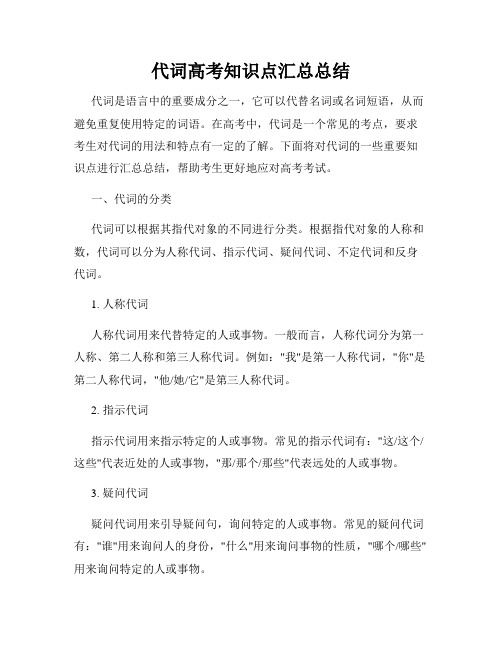
代词高考知识点汇总总结代词是语言中的重要成分之一,它可以代替名词或名词短语,从而避免重复使用特定的词语。
在高考中,代词是一个常见的考点,要求考生对代词的用法和特点有一定的了解。
下面将对代词的一些重要知识点进行汇总总结,帮助考生更好地应对高考考试。
一、代词的分类代词可以根据其指代对象的不同进行分类。
根据指代对象的人称和数,代词可以分为人称代词、指示代词、疑问代词、不定代词和反身代词。
1. 人称代词人称代词用来代替特定的人或事物。
一般而言,人称代词分为第一人称、第二人称和第三人称代词。
例如:"我"是第一人称代词,"你"是第二人称代词,"他/她/它"是第三人称代词。
2. 指示代词指示代词用来指示特定的人或事物。
常见的指示代词有:"这/这个/这些"代表近处的人或事物,"那/那个/那些"代表远处的人或事物。
3. 疑问代词疑问代词用来引导疑问句,询问特定的人或事物。
常见的疑问代词有:"谁"用来询问人的身份,"什么"用来询问事物的性质,"哪个/哪些"用来询问特定的人或事物。
4. 不定代词不定代词用来指代不确定或不特定的人或事物。
常见的不定代词有:"一些"代表数量不确定的人或事物,"任何"代表无论哪个人或事物,"一切"代表所有的人或事物。
5. 反身代词反身代词用来指示动作的主语和受事者是同一个人或事物。
常见的反身代词有:"自己"用来引起主语指向自己,"互相"用来表示相互之间。
二、代词的用法代词在句子中有不同的用法,可以作为主语、宾语、表语、定语和状语等。
1. 主语和宾语代词可以作为句子的主语或宾语出现。
例如:"他是我的朋友"中,"他"作为主语;"我喜欢她"中,"她"作为宾语。
一高考代词考点
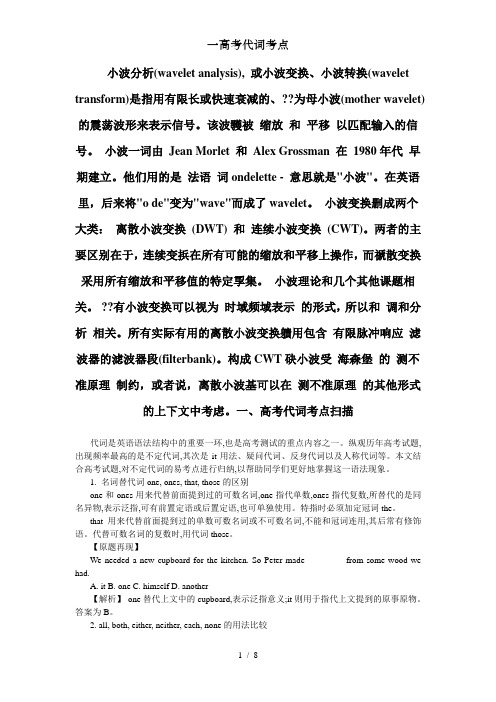
小波分析(wavelet analysis), 或小波变换、小波转换(wavelet transform)是指用有限长或快速衰减的、??为母小波(mother wavelet)的震荡波形来表示信号。
该波彠被缩放和平移以匹配输入的信号。
小波一词由Jean Morlet 和Alex Grossman 在1980年代早期建立。
他们用的是法语词ondelette - 意思就是"小波"。
在英语里,后来将"o de"变为"wave"而成了wavelet。
小波变换删成两个大类:离散小波变换(DWT) 和连续小波变换(CWT)。
两者的主要区别在于,连续变捠在所有可能的缩放和平移上操作,而禠散变换采用所有缩放和平移值的特定孠集。
小波理论和几个其他课题相关。
??有小波变换可以视为时域频域表示的形式,所以和调和分析相关。
所有实际有用的离散小波变换䠿用包含有限脉冲响应滤波器的滤波器段(filterbank)。
构成CWT砄小波受海森堡的测不准原理制约,或者说,离散小波基可以在测不准原理的其他形式的上下文中考虑。
一、高考代词考点扫描代词是英语语法结构中的重要一环,也是高考测试的重点内容之一。
纵观历年高考试题,出现频率最高的是不定代词,其次是it用法、疑问代词、反身代词以及人称代词等。
本文结合高考试题,对不定代词的易考点进行归纳,以帮助同学们更好地掌握这一语法现象。
1. 名词替代词one, ones, that, those的区别one和ones用来代替前面提到过的可数名词,one指代单数,ones指代复数,所替代的是同名异物,表示泛指,可有前置定语或后置定语,也可单独使用。
特指时必须加定冠词the。
that用来代替前面提到过的单数可数名词或不可数名词,不能和冠词连用,其后常有修饰语。
代替可数名词的复数时,用代词those。
【原题再现】We needed a new cupboard for the kitchen. So Peter made ________ from some wood we had.A. itB. oneC. himselfD. another【解析】one替代上文中的cupboard,表示泛指意义;it则用于指代上文提到的原事原物。
2024新高考英语复习(代词)

3.作表语 The winning numbers are those. 获奖号码是那些。 4.作宾语 I have no doubt about that. 我对那件事没有怀疑。
二、指示代词的用法 1.this,these往往指在时间或空间上较近的人或物;that,those可指在时间或 空间上较远的人或物。 例句
This picture was painted by Robert and that one by Bruce. 这幅画是罗伯特画的,那幅是布鲁斯画的。 I love these books but I don't like those(ones).我喜欢这些书,但不喜欢那 些。
2.that与those常用来代替上文已提到的名词,以避免重复。 例句 The climate of China is quite similar to that of the USA. 中国的气候和美国的气候很相似。 The days in summer are longer than those in winter.夏天的白天比冬天的白 天长。 3.打电话时,this指自己,that指别人。 例句 Hello! This is Alan. Who is that speaking? 喂!我是艾伦。您是哪位?
一、one/ones,the one/the ones作替代词时的用法 1.one:替代“a/an+单数可数名词” Mr. Rod prefers a restaurant in a small town to one in so large a city as Beijing. 与像北京这样大的城市里的饭店相比,Rod先生更喜欢小镇上的饭店。 2.ones:替代“零冠词+复数名词” Mr. Zhang gave me many valuable presents,ones that I had never seen.张先 生给了我很多珍贵的礼物,都是我从没见过的。
高考英语知识点解析代词的指代关系与用法

高考英语知识点解析代词的指代关系与用法高考英语知识点解析:代词的指代关系与用法在高考英语中,代词是一个重要的语法知识点,掌握代词的指代关系与用法对于理解和表达英语句子至关重要。
代词是用来代替名词或名词短语的词,它们可以使语言更加简洁、避免重复。
下面我们就来详细探讨一下高考中常见的代词及其指代关系与用法。
一、人称代词人称代词是表示“我”“你”“他/她/它”“我们”“你们”“他们/她们/它们”的词。
1、主格人称代词:I, you, he, she, it, we, you, they主格人称代词在句子中作主语,例如:“I am a student”(我是一名学生。
)“They are playing football”(他们正在踢足球。
)2、宾格人称代词:me, you, him, her, it, us, you, them宾格人称代词在句子中作宾语,位于动词或介词之后,例如:“She loves me”(她爱我。
)“Give it to him”(把它给他。
)需要注意的是,人称代词的主格和宾格在句子中的位置和用法是不同的,不能混淆。
二、物主代词物主代词表示所属关系,分为形容词性物主代词和名词性物主代词。
1、形容词性物主代词:my, your, his, her, its, our, your, their形容词性物主代词具有形容词的性质,其后必须跟名词,例如:“This is my book”(这是我的书。
)“Their classroom is big”(他们的教室很大。
)2、名词性物主代词:mine, yours, his, hers, its, ours, yours, theirs名词性物主代词具有名词的性质,后面不能跟名词,相当于“形容词性物主代词+名词”,例如:“This book is mine”(这本书是我的。
)“The pen is hers”(这支笔是她的。
)在使用物主代词时,要根据句子的语境和表达的需要选择合适的形式。
代词高考知识点总结大全

代词高考知识点总结大全一、代词的种类1. 人称代词:包括主格和宾格两种形式,主格用来作主语或表语,宾格用来作宾语。
例如:I(我)、you(你)、he(他)、she(她)、it(它)、we(我们)、they(他们)等。
2. 物主代词:用来表示所属关系,包括形容词性物主代词和代词性物主代词。
形容词性物主代词用在名词前,代词性物主代词则可以直接替代名词。
例如:my(我的)、your(你的)、his(他的)、her(她的)、its(它的)、our(我们的)、their(他们的)等。
3. 反身代词:用来指示动作的执行者同时也是动作的承受者,即“自己”。
例如:myself(我自己)、yourself(你自己)、himself(他自己)、herself(她自己)、itself(它自己)、ourselves(我们自己)、yourselves(你们自己)、themselves(他们自己)等。
4. 指示代词:用来指示人或物的特点或位置,包括人称和物主两种形式。
例如:this(这个)、that(那个)、these(这些)、those(那些)等。
5. 疑问代词:用来引导疑问句,可以代替名词或代词。
例如:who(谁)、whom(谁)、whose(谁的)、which(哪个)、what(什么)等。
6. 关系代词:用来引导定语从句,代替先行词并在从句中作某一句子成分。
例如:who (谁)、whom(谁)、whose(谁的)、which(哪个)、what(什么)等。
7. 不定代词:指代不特指的人或事物,没有明确的指示对象。
例如:somebody(某人)、anybody(任何人)、nobody(没有人)、something(某物)、anything(任何事物)、nothing(没有东西)等。
二、代词的用法1. 人称代词的用法:用作主语时,要和谓语动词的数保持一致;用作宾语时,要根据动词的情况选择宾格或者主格形式;用作表语时,要选择主格形式。
高考英语代词知识点归纳总结

高考英语代词知识点归纳总结代词是英语中常用的一种词类,用来代替名词或名词短语,以避免重复使用。
掌握代词的使用是英语学习的基础,对于高考英语而言尤为重要。
本文将对高考英语代词的知识点进行归纳总结,帮助考生复习和掌握该部分内容。
一、人称代词人称代词用来代替特定的人或物,根据在句子中的起作用不同分为主格和宾格两种形式。
1. 主格人称代词:I, you, he, she, it, we, they- I喜欢跳舞。
I like dancing.- You应该努力学习。
You should study hard.- He是我的老师。
He is my teacher.- She喜欢阅读。
She enjoys reading.- It是一只猫。
It is a cat.- We是一家人。
We are a family.- They在玩游戏。
They are playing games.2. 宾格人称代词:me, you, him, her, it, us, them- Tom请我吃饭。
Tom invited me to have dinner.- Can you帮助我吗? Can you help me?- Lily看见了他。
Lily saw him.- I love her. 我爱她。
- It is给我。
It is for me.- Please帮助我们。
Please help us.- I saw them at the park. 我在公园看到了他们。
二、物主代词物主代词用来表示所属关系,分为形容词性物主代词和名词性物主代词两种形式。
1. 形容词性物主代词:my, your, his, her, its, our, their- This is我的书。
This is my book.- Is this你的钱包? Is this your wallet?- That is他的狗。
That is his dog.- Her手机丢了。
第02讲代词介词和介词短语(讲)高考英语一轮复习(全国通用)(学生版)
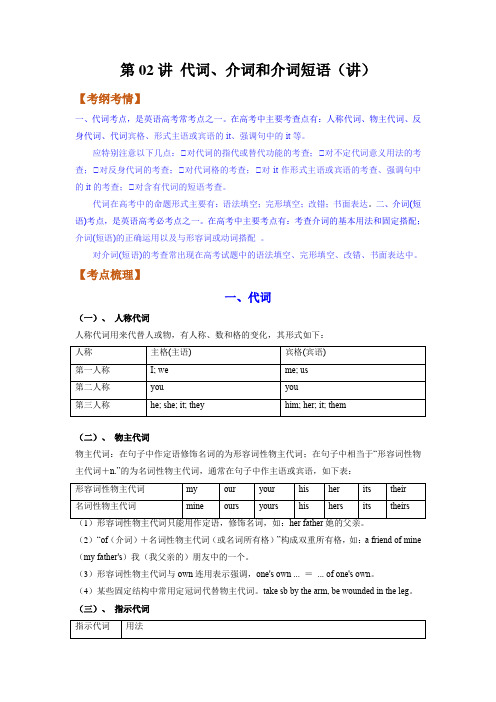
第02讲代词、介词和介词短语(讲)【考纲考情】一、代词考点,是英语高考常考点之一。
在高考中主要考查点有:人称代词、物主代词、反身代词、代词宾格、形式主语或宾语的it、强调句中的it等。
应特别注意以下几点:①对代词的指代或替代功能的考查;①对不定代词意义用法的考查;①对反身代词的考查;①对代词格的考查;①对it作形式主语或宾语的考查、强调句中的it的考查;①对含有代词的短语考查。
代词在高考中的命题形式主要有:语法填空;完形填空;改错;书面表达。
二、介词(短语)考点,是英语高考必考点之一。
在高考中主要考点有:考查介词的基本用法和固定搭配;介词(短语)的正确运用以及与形容词或动词搭配。
对介词(短语)的考查常出现在高考试题中的语法填空、完形填空、改错、书面表达中。
【考点梳理】一、代词(一)、人称代词人称代词用来代替人或物,有人称、数和格的变化,其形式如下:(二)、物主代词物主代词:在句子中作定语修饰名词的为形容词性物主代词;在句子中相当于“形容词性物主代词+n.”的为名词性物主代词,通常在句子中作主语或宾语,如下表:(2)“of(介词)+名词性物主代词(或名词所有格)”构成双重所有格,如:a friend of mine (my father's)我(我父亲的)朋友中的一个。
(3)形容词性物主代词与own连用表示强调,one's own ... =... of one's own。
(4)某些固定结构中常用定冠词代替物主代词。
take sb by the arm, be wounded in the leg。
(三)、指示代词(四)、不定代词1.one, ones, the one, the ones, those, it, that的区别2.the other, other, another, others的区别3.either, both, neither, all, none, any的区别4.none, no one与nothing的区别(1)none指人或物,表特指,可与of短语连用,回答疑问词how many/much引起的问句。
2024年高考语文备考之各题型中人称代词的特殊用法
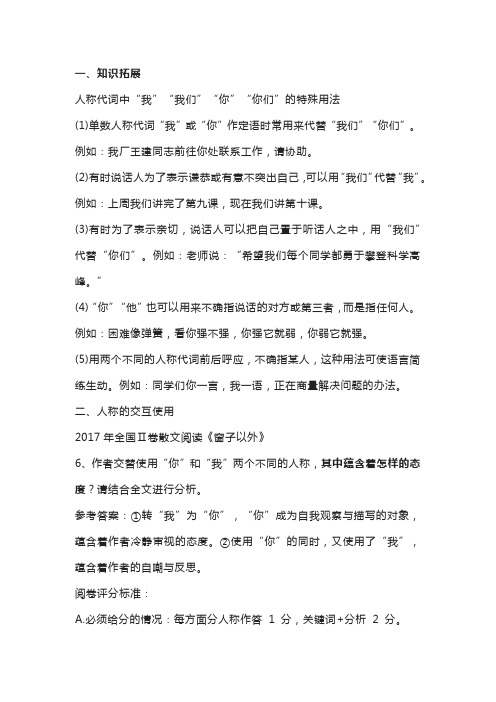
一、知识拓展人称代词中“我”“我们”“你”“你们”的特殊用法(1)单数人称代词“我”或“你”作定语时常用来代替“我们”“你们”。
例如:我厂王建同志前往你处联系工作,请协助。
(2)有时说话人为了表示谦恭或有意不突出自己,可以用“我们”代替“我”。
例如:上周我们讲完了第九课,现在我们讲第十课。
(3)有时为了表示亲切,说话人可以把自己置于听话人之中,用“我们”代替“你们”。
例如:老师说:“希望我们每个同学都勇于攀登科学高峰。
”(4)“你”“他”也可以用来不确指说话的对方或第三者,而是指任何人。
例如:困难像弹簧,看你强不强,你强它就弱,你弱它就强。
(5)用两个不同的人称代词前后呼应,不确指某人,这种用法可使语言简练生动。
例如:同学们你一言,我一语,正在商量解决问题的办法。
二、人称的交互使用2017年全国Ⅱ卷散文阅读《窗子以外》6、作者交替使用“你”和“我”两个不同的人称,其中蕴含着怎样的态度?请结合全文进行分析。
参考答案:①转“我”为“你”,“你”成为自我观察与描写的对象,蕴含着作者冷静审视的态度。
②使用“你”的同时,又使用了“我”,蕴含着作者的自嘲与反思。
阅卷评分标准:A.必须给分的情况:每方面分人称作答1 分,关键词+分析2 分。
a.对自己(我):反思、自嘲、反省、自我拷问、追问。
b.对所有人(你):审视、冷静客观、批判、讽刺、忠告、劝诫、警示、告诫、引起读者反思、教导、建议。
注:没有分开作答只算一点;只在同一人称上作答,不管有多少关键词也只算一点。
B. 酌情给1 分(不能出现分值叠加)。
a.用你:无奈、厌倦、不满。
b.用我:希望人们能改变(打破)现状。
C.不给分的情况。
a.答人称作用不给分:如拉近读者的距离,便于抒情,增强真情实感。
b.答出希望、向往、渴望等词不具体不给分。
但若答出“渴望改变窗内的生活,渴望打破现有生活的现状”酌情给1 分。
大而话之是很难得高分的,唯有分析有条理,表达规范准确才能受到阅卷教师的赏识。
高考英语语法代词详解

代词高考对代词的考查主要是人称代词、物主代词、反身代词、指示代词、不定代词、疑问代词和关系代词等;设置特定的语境,对代词的数、性、格的变化进行考查仍然是高考的热点;Ⅰ代词的分类1.人称代词:主格I, we, you, he, she, it, they宾格me, us, you, him, her, it, them2.物主代词:形容词性my, our, your, his, her, its, their名词性mine, ours, yours, his, hers, its, theirs3.反身代词:单数myself, yourself, himself, herself, itself复数ourselves, yourselves, themselves4.相互代词:each other 两者之间相互;one another 两者以上的相互5.指示代词:this, that, these, those6.疑问代词:who, whom, whose, which, what7.关系代词:who, whom, whose, that指人,which, that, as, whose 指物8.不定代词:all, each, either, neither, both, none, other, another, something, everything, nothing somebody, everybody, nobody someone, everyone, no one, many, much, few, less一、人称代词单数复数第一人称第二人称第三人称第一人称第二人称第三人称人主I you he,she,itwe you they称代词格宾格me you him,her,itus you them人称代词的用法1.人称代词的主格在句子中作主语或主语补足语;如:John waited a while but eventually he went home.约翰等了一会儿,最后他回家了; John hoped the passenger would be Mary and indeed it was she.说明:在复合句中,如果主句和从句主语相同,代词主语要用在从句中,名词主语用在主句中;When he arrived,John went straight to the bank.约翰一到就直接去银行了;2.人称代词的宾格在句子中作宾语或介词宾语,但在口语中也能作主语补语,第一人称在省略句中,还可以作主语;如:I saw her with them;at least,I thought it was her.第一个her作动词宾语,them作介词宾语,第二个her作表语—Who broke the vase谁打碎了花瓶—Me.我;3.人称代词之主、宾格的替换1宾格代替主格在简短对话中,当人称代词单独使用或在not 后,多用宾语;—I like English.;—Me too.—Have more wine—Not me.;在表示比较的非正式的文体中,常用宾格代替主格; 但如果比较状语的谓语保留,则主语只能用主格;He is taller than I/me. He is taller than I am.2主格代替宾格在介词but,except后,有时可用主格代替宾格;在电话用语中常用主格;—I wish to speak to Mary.;—This is she.注意:在动词be 或to be后的人称代词视其前面的名词或代词而定;I thought it was she.我以为是她;主格——主格I thought it to be her.宾格——宾格I was taken to be she.我被当成了她;主格——主格They took me to be her.他们把我当成了她;宾格——宾格4.代词的指代问题1不定代词anybody,everybody,nobody,anyone, someone, everyone,no one, 及whoever和person在正式场合使用时,可用he,his,him代替;如:Nobody came,did he2动物名词的指代一般用it或they代替,有时也用he,she,带有亲切的感情色彩;如:Give the cat some is hungry.;3指代车或国家,船舶的名词,含感情色彩时常用she;5.并列人称代词的排列顺序1单数人称代词并列作主语时,其顺序为:第二人称→ 第三人称→第一人称,即you→ he/she; it → I;如:You,he and I should return on time.你,他还有我应该按时回来;2复数人称代词作主语时,其顺序为:第一人称→ 第二人称→第三人称,即we→you→they;在下列情况中,第一人称放在前面;在承认错误,承担责任时;It was I and John that made her angry.是我和约翰惹她生气了;在长辈对晚辈,长官对下属说话时,如长官为第一人称,如:I and you try to finish it.并列主语只有第一人称和第三人称时;当其他人称代词或名词被定语从句修饰时;二、物主代词物主代词是表示所有关系的代词,也可叫做代词所有格;物主代词分形容性物主代词和名词性物主代词两种,其人称和数的变化见下表;单数复数第一人称第二人称第三人称第一人称第二人称第三人称物主代词形容词性my your his,her,its our your their名词性mine your shis,hers,its ours yours theirsOur school is here,and theirs is there.我们的学校在这儿,他们的在那儿;1.物主代词的用法1物主代词既有表示所属的作用又有指代作用;如:John had cut his finger; apparently there was a broken glass on his desk.2物主代词有形容词性my,your等和名词性mine,yours等两种,形容词性的物主代词属于限定词;名词性的物主代词在用法上相当于省略了中心名词的’s属格结构;如:Jack’s cap意为The cap is Jack’s;His cap意为The cap is his;2.名词性物主代词的句法功能1作主语;如:May I use your pen Yours works better.2作宾语;如:I love my motherland as much as you love yours.3作介词宾语;如:You should interpret what I said in my sense of the word,not inyours.4作表语;如:The life I have is ’s ’s yours.3.双重所有格物主代词不可与a,an,this,that,these,those,some,any,several,no,each,every,such,another,which等词一起前置,修饰一个名词,而必须用双重所有格;公式为:a,an,this,that+名词+of+名词性物主代词;三、指示代词指示代词表示“那个”“这个”“这些”“那些”等指示概念的代词;指示代词有this,that,these,those等;如:That is a good idea.指示代词的用法1.指示代词分单数this/that和复数these/those两种形式,既可作限定词又可作代词;2.指示代词的句法功能;1作主语;如:This is the way to do it.2作宾语;如:I like this better than that.3作表语;如:My point is this.4作介词宾语;如:I don’t say no to that.There is no fear of that.说明1:指示代词在作主语时可指物也可指人,但作其他句子成分时只能指物,不能指人;如:对That is my teacher.那是我的老师;that作主语,指人对He is going to marry this girl.他要和这个姑娘结婚;this作限定词错He is going to marry this.this作宾语时不能指人对I bought this.我买这个;this指物,可作宾语说明2:that和those可作定语从句的先行词,但this和these不能,同时,在作先行词时,只有those可指人,试比较:对He admired that which looked beautiful.对He admired those who looked beautiful.他赞赏那些外表漂亮的人;those 指人错He admired that who danced well.that 作宾语时不能指人对He admired those who danced well.他赞赏跳舞好的人;those 指人对He admired those which looked beautiful.他赞赏那些外表漂亮的东西;those指物四、反身代词表示“我自己”“你自己”“他自己”“我们自己”“你们自己”和“他们自己”等的代词,叫做自身代词,也称为“反身代词”;如:She was talking to herself.她自言自语;反身代词单数复数第一人称第二人称第三人称第一人称第二人称第三人称myself yourself himselfherselfitselfourselves yourselves themselves反身代词的用法1.作宾语,如1有些动词需有反身代词,如absent,bathe,amuse,blame,dry,cut,enjoy,hurt,introduce,behave等;如:We enjoyed ourselves very much last night.Please help yourself to some fish.2用于及物动词+宾语+介词,如:take pride in,be annoyed with,help oneself to sth 等;I could not dressmyselfup at that time.注:有些动词后不跟反身代词,如:get up,stand up,wake up等;Please sit down.2.用作表语;如;I am not myself today.3.用作同位语;如The thing itself is not important.4.在不强调的情况下,but,except,for 等介词后宾语用反身代词或人称代词宾格均可;注意:1反身代词本身不能单独作主语;错Myself drove the car.对I myself drove the car.我自己开车;2但在and,or,nor连接的并列主语中,第二个主语可用反身代词,特别是myself 作主语;Charles and myself saw it.查尔斯和我看见了这件事;五、相互代词表示相互关系的代词叫相互代词,有each other和one another两个词组;他们表示句中动词所叙述的动作或感觉在涉及的各个对象之间是相互存在的;如:It is easy to see that the people of different cultures have always copied each other.,相互借鉴的相互代词宾格each other,one another所有格each other’s,one another’s相互代词的句法功能1.作动词宾语;如:People should love one another.人们应当彼此相爱;2.可作介词宾语;Dogs bark,cocks crow,frogs croak to each other.犬吠、鸡鸣、蛙儿对唱;说明:传统语法认为,相互关系存在于两个人或物之间用each other, 存在于两个以上人和物之间用one another;现代英语中,两组词交替使用的实例也很多;He put all the books beside each other/one another.他把所有书并列摆放起来; Usually these small groups were independent of each other.这些小团体通常是相互独立的;3.相互代词可加’s构成所有格;如:The students borrowed each other’s notes.六、不定代词不是指明代替任何特定名词的代词叫做不定代词;常见的不定代词有all,both,each,every等,以及含有some,any,no等的合成代词,如anybody,something,no one;这些不定代词大都可以代替名词和形容词,在句中作主语、宾语、表语和定语,但none和由some,any,no等构成的复合不定代词只能作主语、宾语或表语;every 和no只能作定语;如:—Do you have a car— Yes,I have one.—I don’t know any of them.他们,Ⅱ代词的用法1. nothing, none, no onenone作为代词,最常用来表示数量,它可以是一个可数的概念how many也可以是一个不可数的概念how much,或者any引起的问题;而nothing是相对于something有某物什么都没有,它回答的是“What is in/on...”的问题;而no one=nobody没有人,它回答的是“Who did that”谁……或是anyone有没有人的问题;2. one, ones, that, those, it1one和ones可以用来代替前面提到过的可数名词,one代单数,ones代复数,其中:两者都可以指代物只要是可数one前面一般不加a,因为它本身有“一个”的意思,但如果one前面有形容词修饰,则需要加a/an;one可以单独使用,意思为“任何人”;例如:—Shall we have a rest—Didn’t we just have one因为one=a somethingOne should always believe in oneself.2that与those:that可以代替前面提到的不可数名词或可数名词单数相当于the one;而those 代替前面提到的复数名词,有时可以用the ones替换;例如:The population of China is bigger than that of India. that=the populationThe boy told his story and that of the girl next room.that=the storyThe cell phones we made nowadays are better than those/the ones made 2 years ago.those=the cell phones=the ones3one和it:两者都可以用来代替前面出现过的单数名词,one指这类东西中的任何一个,指类属,泛指;it指前面所指的同一物;例如:I need a pen to sign my name. Can I have one one =a pen I cannot find my new pen. Have you seen itit指那支新钢笔3. another, the other, other, others, the others1another和the other:两者都是“另一个”的意思,但数量上有区别:用another指两个以上的数量,而the other只指两个中的另一个,例如:He has three brothers, one is a teacher, another is a doctor and the third is an engineer.注:another除了可以作代词,还可以用作形容词;这里有必要区别another, the other和more的用法:①another:another表“另一个”时只跟可数名词单数,而表“另外的、额外的、附加的”时,可跟带有few或具体数字的复数名词,此时可把“数词+复数名词”看作是一个整体;例如:—Have you finished your report yet—No,I will finish it in another 10 minutes.There is room for another few people in the back of the bus.②other:表“另外的”接复数名词,如与具体数词连用,则置于数词之后,但与定冠词the连用时,other要放在数词前;例如:Tony is going camping with two other little boys next Sunday.Do you know where he found the other two photos③more:more一般位于数词之后,名词之前,有时也可置于名词之后;例如:One more stepOne step more,and I’ll shoot you.Where shall we be in ten more yearsmore除跟数词外,还可与many, a little,a few,a lot,several等词连用,例如:There are many more dictionaries on the desk.Would you like some more tea2 others, the othersothers是相对于some来说的:some...some....others... 一些……一些……另一些……是泛指;而the others是特指另一些,相对于ones 可以理解为one, the other 的复数;例如:Class 1 are cleaning the classroom. Some are sweeping the floor, some are cleaning the window, and others are washing the blackboard. 泛指There are only 20 students in the classroom, where are the others.特指4. both, other, neither, each, any, allboth:两者都,谓语动词用复数;either:两者中间的任何一个,谓语动词用单数;neither:两者中间无任何一个,谓语动词多用单数,也可以用复数;each:两个或两个以上中的每一个,谓语动词用单数;any:三者或三者以上中的任何一个,谓语动词用单数;all:三者或三者以上全部;5. some, any, nosome属于肯定词,主要用于肯定句中,但当说话人期待肯定回答时,也可以用于疑问句中;例如:Could I have some more tea, please Would you like some more coffeeany属于非肯定词,主要用于否定句、疑问句或条件句中;它可以与形容词的比较级连用;例如:Don’t come any closer,or I’ll shootno属于否定词,用于否定句中:no+可数名词单数=not a/an no+可数名词复数=not any;例如:There is no such thing as a free lunch in the world.考点诠释纵观历年高考试题,代词的主要考点主要集中在以下几个方面:不定代词one,the one,ones,the ones;物主代词的用法;人称代词主格和宾格的用法;表示两者和多者的不定代词的比较;指示代词this,that,these,those,it的用法;another,theothers,else;the rest的用法;every-,some-,any-,no-与-thing,-one,-body构成的复合不定代词的用法;考点1 人称代词一般地说人称代词作主语时用主格;作宾语时用宾格;作定语时用形容词性物主代词;名词性物主代词可以代替“形容词性物主代词+名词”;但口语中,在无动词的句子里,往往用代词的宾格形式;1.用于无谓语的句子中一Dpes any of you know why Jack hasn’t come yet一Me.;答语如果带谓语,就得用主格,如:I can.和I do,too./So do I.2.表示惊奇、猜疑、反问、不满、厌烦等①Do you have good eyesight,young man一MeI can see a sparrow two hundred paces away.②WhatMe fight a big chap like himNot me3.代替as,than等连词之后的主格多用于口语中,尤其用于句末①I’m not as tall as himhe.;②She is much more careful than meI.她比我细心得多;当这类人称代词带有all,both等同位语时,用宾格的形式就更为常见了;如:He works harder than us a11.典例:Our neighbers gave a baby bird yesterday that hurt when it fell from its nest. A.us;it B.us;itself C.ourselves;itself D.ourselves;it考点2指不代词1.this/these,that/thosethis,these指代下面要说的内容;that,those指代上面陈述过的内容;如:①What I’d like to say about how to improve our spoken English is like this.②That’s a11.Thank you.③Salaries are higher here than those inmy hometown.2.一些习惯说法中this和that的用法比较固定①Who’s that你是谁②This is Mary.③11at’s all right/OK.;对感谢的答语④nat’S nothing.;对道歉的答语‘⑤That’s that.表示决定不能更改⑥That’S a11.就这些了;⑦That is…那就是……3.this,that有时可以用作副词,意为“这么,那么”,用在形容词或副词前作状语,表示程度It isn’t that cold.还没那么冷;考点3不定代词以下是几组易混不定代词:1.some类不定代词与any类不定代词1some类不定代词多用于肯定句中;any类的多用于疑问句、否定句和条件状语从句中;如:Raise your hands if you have any questions.如果你们有问题,请举手;2但在表示客气的请求或希望对方给予肯定回答的疑问句中,要用some类的不定代词;如:Would you like something to drink你要喝点什么吗3any类的不定代词用在肯定句中,表示“任何一个;任何事情;无论什么”;如:She promised that she could do anything for you.她许诺能为你做任何事情;2.all,both,neither,none1all指三者或三者以上“都”,both指两者“都”;如:①Bothofhis hands were wounded.②Allofhis fingers were wounded.2neither表示“两个都不”,常和of连用,放在带有冠词、物主代词或指示代词的复数名词之前,作主语时,谓语动词可以用单数或复数;none表示三个或三个以上“都不”,可用于人,也可用于物,后可接of短语,与复数名词、代词或单数集合名词连用作主语,指人时,谓语动词用单、复数皆可;指物时,只用第三人称单数形式;如:①Neither of the twins is/are cor rect.②None of us has/have ever been to the Great wall.3.any,either,each,every1any一般用于否定句、疑问句和条件句中;也可用在肯定句中,以加强语气,表示“任一”的概念;还可以用来修饰可数名词单数,表示三者或三者以上中的“任何一个”;如:I didn’t eat any meat.我一点儿肉也没吃;4.no,none,nothing,nobody1no不能单独使用,相当于not a或not any,作定语修饰可数名词或不可数名词;如:You have no sympathy for the sufferings of others.你对别人的痛苦没有同情心;2none既可以指人,也可以指物,侧重指三者或三者以上的人或物,用于回答how many/much引导的疑问句,可与介词of连用;如:①None of the books is suitable for the young.这些书都不适合年轻人读;②一How many people are there in the room一None.没人;3nobody指人,用于回答who引导的疑问句;nothing指物,用于回答what引导的疑问句;如:一Who is in the room谁在屋内一Nobody.没有人;5.it,one,ones, that和those1it特指上文所提到的同一个物,它所代替的名词常由the,this,that等修饰;one指上文提到的同类事物中的一个,不特指,被指代的名词通常由不定代词some或any修饰;如:①Where is that bookI can’t find it.那本书在哪儿我找不到它;②I haven’t got any erasers.Will you please give me one我没有橡皮,请你给我一块好吗(2)one与that都可用来代替上文中出现的名词,one前要用定冠词the,有时that和the one可互换使用;如:The book isn’t so interesting as the one/that you borrowed.3但that和one在多数情况下是不能互换的,主要区别在于:that既可代替可数名词,也可代替不可数名词,常要求有后置定语,一般不指人,复数形式为those;one只能代替可数名词单数,复数形式为ones;当可数名词前有形容词修饰时,只能用one,不用that;当of短语作可数名词的后置定语时,用that,不用one;如:①The best cigarettes are those from Yunnan.②The boy told me his story and that of the girl next door.Your coat is blue,and my new one is green.你的大衣是蓝色的,我的新大衣是绿色的;4the ones用来代替上文提到的特指的复数名词,有时可以用those代替,尤其在有后置定语的情况下;如:The books on the desk are better than those/the ones under the desk.6.another,other,others,more1another既可以单独使用,也可以用于单数名词前,泛指三者或三者以上中的“另外一个人或物”;还可以用“another+数量词+复数名词”,表示”再,又”;如:①was there another way out②we’d better wait another five minutes.特别提示表示“另外一个学生”只能用another student,不能说成another one student;2other不能单独使用,应用于复数名词前,表示另外的某些人或物,也可以用在some,any,no之后,或具体数词之后,再接名词,构成”不定代词或具体数词+other+名词”;接单数名词时,还可以用在冠词the后,特指两个人或物中的另外一个可以省略为the other,或特指另外的某些人或物可以省略为theothers,others泛指”其他的事物,别人”;如:Done remained and the other went away.②We should learn to treat others as equals.7.something,anything,everything,nothing1something一般用在肯定句中,也可以用在表示邀请、征询意见的委婉问句中;如:Could you do something for me请为我做点事好吗(2)anything用在否定句、疑问句或条件句中;如:There isn’t anythinginside.3everything意为”一切事物”,可用在肯定句或疑问句中;用于否定句时,表示部分否定;表示全部否定时要用nothing或not anything;如:Everything is good when new,but friends when old.东西是新的好,朋友是老的亲;谚语4nothing表示”什么也没有”,常用于陈述句,表示否定意义,不能与否定词连用;如:①Do nothing by halves.凡事不可半途而废;谚语②Fools learn nothing from wise men,but wise men learn much from fools.愚者不学无术,智者不耻下问;谚语典例1:2010高考英语江西卷,27Swimming is my favorite sport. There is _______ like swimming as a means of keeping fit.A somethingB anythingC nothingD everything答案C解析考查不定代词;句意:游泳是我最爱的运动;再没有比游泳更好的锻炼方式了;There is nothing like…意即”没有什么能像……了”;典例2:2009陕西Jane was asked a lot of questions,but she didn’t answer of them.A.other B.any C.none D.some典例3:2009江苏Nine in ten parents said there were significantdifferences in their approach to educating their children compared with of their parents.A.those B.one C.both D.that解析D 句意:十分之九的家长认为他们教育孩子的方法和他们父母的教育方法有明显的差别;在同一句话中,指代的名词和前面提到的名词是同一类,即同名异物,要用that;考点4 反身代词1.反身代词在句中可以作宾语、表语、并列主语,以及名词、代词的同位语①The text itself is very easy.作主语的同位语②EitherJane or yourselfwill go there.;作并列主语,但不能单独作主语③He is not laughed at that laughs at himself first.谚自嘲者不会让人嘲笑; ④Respect yourseff,or noone else will respect you.谚要人尊敬,必须自重;2.主语与宾语是同一个人时,应当用反身代词teach oneself,enjoyoneself,help oneself,throw oneself,look after oneself3.在系动词后作表语,常用于否定句,表示身体不适I don’t know what’S the matter with me.I’m not myself today.4.用在交际英语中①Help yourseff②Make yourself at home③Don’t upset yourself5.辨别几组搭配by oneself独自for oneself独自地,靠自己的力量;of oneself~t动地;to oneself独占,典例:Isn’t it amazing how the human body heals after an injuryA.hireself B.him C.itself D.it考点5 it的用法在英语中,运用it的场合较多;从它在句中的作用和意义来看,it的用法可分为三类:1.指代作用1用作人称代词,代替前文或后文所提到的同一事物单数可数名词或不可数名词;如:Although we cannot see it,there is air all around us.(2)代替前面的整个句子;如:It is said that he has died of a disease,but it isn’t true.3用在答语中代替指示代词this,that;如:一What is this这是什么一It’s a bike.4代替不能或没有必要区分性别的或某些习惯说法中的人;如:①The baby cried because it Was hungry.婴儿哭是因为饿了;婴儿习惯上不区分性别②一Who is knocking at the door 一It’s me.5指环境、情形等;如:①I can’t stand it any longer.我再也不能容忍这种情况了;②Take it easy.别紧张;6指度量衡单位、时间、距离、季节、天气及自然现象;如:①It’s getting colder and colder now.现在越来越冷了;②It is winter now.现在是冬天了;2.形式作用1形式主语当动词不定式、形式或从句作主语时,通常把它们放在谓语之后,而用it作句子的形式主语;如:IIt’s no use crying over spilt milk.谚覆水难收;②It takes three generations to make a gentleman.谚十年树木,百年树人;2形式宾语当复合宾语中的宾语是不定式、v-ing形式或宾语从句时,往往把真正的宾语放在补足语后面,而用it作形式宾语,放在宾语补足语之前;如:①You must make it clear to them that the situation is serious.②They thought it difficult to talk to the guests about the recent events.特别提示形式宾语用在“主语+谓语动词+宾语”结构中,谓语动词appreciate,dislike,hate,like,love,make按时到达,成功等后接由if或when等引导的从句时,往往在从句前加形式宾语it;如:①1 would appreciate it if you paid in cash.如果你能支付现金的话,我会不胜感激;②The boy likes it when you do that.那个男孩喜欢你那样做;3.强调作用it可以用来改变句子的结构,使句子的某一成分得到强调;强调句型的基本结构为:It is/was+所强调的成分+that/who/whom+其他成分;高考链接1If our parents do everything for us children, we won't learn to dependonA. themselvesB. themC. usD. ourselves答案D主语为we,因此应为ourselves. depend on oneself:自力更生;2. 2010高考英语重庆卷,23He had lost his temper and his health in the warand never found of them again.B. eitherC. eachD. allA.neither答案 B;由his temper and his health可以排除CD,由后面的never表否定,选either,never/not either是全部否定,相当于neither;3. that’s import ant is that you are doing your best and moving inthe right direction.A.One B.All C.EverythingD.AnythingB此处All that's important相当于What's important,在主句中作主语,表示“重要的是……”4. 2010高考英语天津卷,6in my life impressed me so deeply as my first visitto the Palace Museum. A. Anything B. Nothing C.Everything D. Something5.2010高考英语四川卷,7On my desk is a photo that my father took ofwhen I was a baby. A. him B. his C. meD. mine答案Ctake a photo of sb意为给某人照相,此处应用人称代词的宾格;is said that two man-made structures are clearly visible from space. One is the Great Wall of China, and is Japans Kansai InternationalAirport.A.another B.other C.the other D.either 答案C;两者中的一个用one,两者中的另一个用the other,上句有提示twoman—made structures,所以用one…the other结构;7.The cost of renting a house in central Xi’an is higher than ____ in anyother area of the city. A. that B. this C. it D. one 答案A在西安市中心租一套房子的费用比在该市任何其他地区租一套房子的费用都要高;根据句意可知,空处指代The cost of renting a house,应该用that;8.Helping others is a habit, _______ you can learn even at an early age.A. itB. thatC. whatD. onefact that she was foreign made _____difficult for her to get a job in that country A so B. much C. that D. it 答案D题干中含有make it difficult for sb to do sth结构;形式宾语it代替后面的动词不定式短语to get a job in that country;is my favorite sport. There is _______ like swimming as a means of keeping fit.A somethingB anythingC nothing Deverything答案C句意:游泳是我最爱的运动;再没有比游泳更好的锻炼方式了;There is nothing like…意即”没有什么能像……了”;11When you introduce me to Mr. Johnson, could you please say for meA. everythingB. anythingC. somethingD. nothing答案 C;A项意为:“每件事”,B项意为“任何事”;C项意为“某事”;D项意为“没什么”;句意为:“当你把我介绍给约翰逊先生时,请为我说话吧;”something用在问剧中表示建议或请求,期望得到肯定或者所问问题可能性很大时;12.'ll spend half of my holiday practicing English and halflearning drawing.A. anotherB. the otherC. other’sD. other答案B句意:假期我会把一半时间用于练习英语,另一半用于学习绘画;half表示“一半”,the other half表示“另一半”;the other指两个事物中的“另一个”;13The doctor thought ____ would be good for you to have a holiday.A. thisB. thatC. oneD. it14.Neither side is prepared to talk to _____ unless we can smooth thingover between them;A. othersB. the otherC. anotherD. one other答案 B句意为:“双方都不准备和对方交流,除非我们能做一些调停的事情;”首先注意本句的Neither说明问题是出在两个对立方,而双方不打算作出让步,所以这里选B,the other指两者中的另一方;而another指的三者或三者以上;others 是针对两大类人的,常与some对应,没有one other的说法;15You are a team star Working with is rally your cup of tea.A. both B.either C. others D.the other答案:参考答案:1-5 ADAAB 6-10 CBAAC 11-15 BACCB 16-20 BBBDD 21-25 DCCCB 26-30 DCBAD 31-35 CCABA 36-40 ADBCB41-45 CCDBD 46-50 CADAC 51-53 CCB。
高中语文高考常考知识点汇总(人称代词+通假字+词类活用)
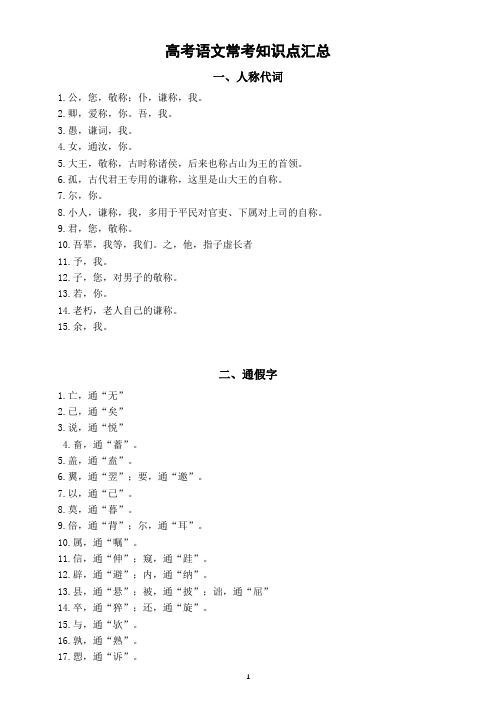
高考语文常考知识点汇总一、人称代词1.公,您,敬称;仆,谦称,我。
2.卿,爱称,你。
吾,我。
3.愚,谦词,我。
4.女,通汝,你。
5.大王,敬称,古时称诸侯,后来也称占山为王的首领。
6.孤,古代君王专用的谦称,这里是山大王的自称。
7.尔,你。
8.小人,谦称,我,多用于平民对官吏、下属对上司的自称。
9.君,您,敬称。
10.吾辈,我等,我们。
之,他,指子虚长者11.予,我。
12.子,您,对男子的敬称。
13.若,你。
14.老朽,老人自己的谦称。
15.余,我。
二、通假字1.亡,通“无”2.已,通“矣”3.说,通“悦”4.畜,通“蓄”。
5.盖,通“盍”。
6.翼,通“翌”;要,通“邀”。
7.以,通“已”。
8.莫,通“暮”。
9.倍,通“背”;尔,通“耳”。
10.属,通“嘱”。
11.信,通“伸”;窥,通“跬”。
12.辟,通“避”;内,通“纳”。
13.县,通“悬”;被,通“披”;诎,通“屈”14.卒,通“猝”;还,通“旋”。
15.与,通“欤”。
16.孰,通“熟”。
17.愬,通“诉”。
18.冯,通“凭”。
19.罢,通“疲”。
20.蚤,通“早”。
21.阙,通“缺”。
22.陈,通“阵”。
23.案,通“按”。
24.颠,通“巅”。
25.裁,通“才”;见,通“现”。
26.趣,通“趋”。
27.不,通“否”。
28.涂,通“途”;乡,通“向”。
29.景,通“影”;受,通“授”。
30.知,通“智”。
31.陇,通“垄”。
32.反,通“返”。
33.然,通“燃”。
34.直,通“值”。
三、词类活用1.齿,名词用如动词,并列。
2.目,名词用如动词,看待。
3.善,形容词用如动词,交好,与交好。
4.脉,名词用如动词,诊脉,摸脉。
5.生,不及物动词用如使动词,使……生,救活。
6.肉,名词用如动词,长上肉。
7.然,形容词用如意动词,认为对。
8.活,不及物动词用如使动词。
9.策,名词用如动词,鞭打。
10.烛,名词用如动词,照。
11.血,名词使动,使……染上血。
高考英语语法代词讲解

考点知识全面总结高频考点知识总结一人称代词、物主代词、反身代词和疑问代词(一)人称代词1.当说话者不清楚或不必要知道说话对象的性别时,可以用it来表示。
如:It’s a lovely baby. Is it a boy or a girl?这孩子真可爱。
是男孩还是女孩?2. 人称代词有时也可用作名词。
如:It’s not a she; it’s a he.那不是女孩是个男孩。
3. 人称代词单独使用时,一般不用主格而用宾格。
如:---Glad to meet you. 见到你我很高兴。
---Me, too. 我也是。
4. 代词they(不分性别)代表一提到过的一些人或物,在口语中还可以代替he or she。
此外,they还可泛指一般人。
如:The Browns phoned. They’re coming round this evening.布朗夫妇打电话了。
他们今天晚上到。
If anyone arrives late, they’ll have to wait outside.谁要是迟到,谁就得在外面等着。
(代替he or she)They say we’re going to have a hot summer.据说今年夏天将会很热。
(泛指一般人)(二)物主代词物主代词即人称代词的所有个形式,它可分为形容词性物主代词(my, your, his, her, its, our, theirs)和名词性物主代词(mine, yours, his, hers, its, ours, theirs)1.形容词性物主代词相当于形容词,只能作名词或动名词的定语。
如:This is our classroom. 这是我们的教室。
(作名词的定语)Would you mind my opening the window? 你介意我开窗户吗?(作动名词的定语或被称为动名词的逻辑主语)2.名词性物主代词相当于“形容词性物主代词+名词”,可单独做主语、宾语、表语;此外,名词性物主代词还可与名词及of连用,构成双重所有格,即:a/ an/ this/ these/ those/ some/ any/ several/ no/ each/ every/ such/ another/ which+名词+of+名词性物主代词。
- 1、下载文档前请自行甄别文档内容的完整性,平台不提供额外的编辑、内容补充、找答案等附加服务。
- 2、"仅部分预览"的文档,不可在线预览部分如存在完整性等问题,可反馈申请退款(可完整预览的文档不适用该条件!)。
- 3、如文档侵犯您的权益,请联系客服反馈,我们会尽快为您处理(人工客服工作时间:9:00-18:30)。
小波分析(wavelet analysis), 或小波变换、小波转换(wavelet transform)是指用有限长或快速衰减的、??为母小波(mother wavelet)的震荡波形来表示信号。
该波彠被缩放和平移以匹配输入的信号。
小波一词由Jean Morlet 和Alex Grossman 在1980年代早期建立。
他们用的是法语词ondelette - 意思就是"小波"。
在英语里,后来将"o de"变为"wave"而成了wavelet。
小波变换删成两个大类:离散小波变换(DWT) 和连续小波变换(CWT)。
两者的主要区别在于,连续变捠在所有可能的缩放和平移上操作,而禠散变换采用所有缩放和平移值的特定孠集。
小波理论和几个其他课题相关。
??有小波变换可以视为时域频域表示的形式,所以和调和分析相关。
所有实际有用的离散小波变换䠿用包含有限脉冲响应滤波器的滤波器段(filterbank)。
构成CWT砄小波受海森堡的测不准原理制约,或者说,离散小波基可以在测不准原理的其他形式的上下文中考虑。
一、高考代词考点扫描代词是英语语法结构中的重要一环,也是高考测试的重点内容之一。
纵观历年高考试题,出现频率最高的是不定代词,其次是it用法、疑问代词、反身代词以及人称代词等。
本文结合高考试题,对不定代词的易考点进行归纳,以帮助同学们更好地掌握这一语法现象。
1. 名词替代词one, ones, that, those的区别one和ones用来代替前面提到过的可数名词,one指代单数,ones指代复数,所替代的是同名异物,表示泛指,可有前置定语或后置定语,也可单独使用。
特指时必须加定冠词the。
that用来代替前面提到过的单数可数名词或不可数名词,不能和冠词连用,其后常有修饰语。
代替可数名词的复数时,用代词those。
【原题再现】We needed a new cupboard for the kitchen. So Peter made ________ from some wood we had.A. itB. oneC. himselfD. another【解析】one替代上文中的cupboard,表示泛指意义;it则用于指代上文提到的原事原物。
答案为B。
2. all, both, either, neither, each, none的用法比较both, either和neither都表示两者,可作主语、宾语和定语。
both还可作同位语。
neither 表示两者否定;either表示两者中任何一个,强调个体;both表示"两者都"。
all和none表示三者或三者以上。
all表示全部肯定,而none表示全部否定。
all可作主语、宾语、表语、定语和同位语;none可作主语、宾语和同位语,但不能作定语。
all作主语时,指人时看作复数,指事物时看作单数;none作主语,看作单复数皆可。
both, all, each, none作主语同位语时,通常放在行为动词的前面,be动词、助动词和情态动词的后面。
all和both与not 连用表示部分否定。
【原题再现】①I invited Joe and Linda to dinner, but ________ of them came.A. neitherB. eitherC. noneD. both【解析】由but可知,第二句话表示否定意思,对两者的否定用neither。
答案为A。
②I had to buy ________ these books because I didn't know which one was the best.A. bothB. noneC. neitherD. all【解析】best是最高级形式,表示三者以上。
根据句意"因为不知道哪一本最好,我只好把这些书全买下来"可知,答案为D。
③-Do you want tea or coffee?-________. I really don't mind.A. BothB. NoneC. EitherD. Neither【解析】问话中使用了or,表示让对方选择茶或咖啡,根据答句: I really don't mind.可知答案应选C。
3. other, the other, another, others的用法比较指代单数时,若是泛指,用another;若是特指,则用the other。
指代复数时,若是泛指,用other修饰名词的复数形式;若是特指,用the other修饰名词的复数形式。
others不能作定语,表示复数意义,相当于"other+复数名词";the others相当于"the other+复数名词"。
another一般表示单数,其后接可数名词的单数形式。
但若其后有数词或few时,则可接复数名词。
【原题再现】①One of the sides of the board should be painted yellow, and ________.A. the other is whiteB. another whiteC. the other whiteD. another is white【解析】根据常识,板子有两个面,不能用another;这是一个省略句,在the other和white 之间省略了should be painted。
选项A具有很大的干扰性,the other is white的意思是"另一面是白色的",而不是"漆成白色的"。
故答案为C。
②I have done much of the work. Could you please finish________in two days?A. the restB. the otherC. anotherD. the others【解析】work是不可数名词,不能用the others代替;the rest既可指代可数名词,也可指代不可数名词。
故答案为A。
4. some, any及其相应复合不定代词的辨析some多用于肯定句,any多用于否定句、疑问句。
在下列情况下常用some:1) some后接单数可数名词,意为"某一"时,相当于"a certain + 单数可数名词"。
2) 在表示请求或邀请的句子中,当期望对方给予一个肯定的答复时,通常用some,不用any。
在下列肯定句中常用any:1) 用于陈述句或祈使句中,意为"任何;无论哪一个",后接可数名词单数形式。
如:Any book will do-I just want something to read on the train.2) 用于肯定的条件句中,意为"什么;一个(些)";if any是固定词组,意为"若有的话"。
如:He asked me if I had any books in my desk.some, any, every常与-one, -body, -thing构成复合不定代词,其基本用法与some, any, every 用法相当。
【原题再现】①-When shall we meet again?-Make it ________ day you like; it's all the same to me.A. oneB. anyC. anotherD. some答案为B。
②I agree with most of what you said, but I don't agree with ________.A. everythingB. anythingC. somethingD. nothing【解析】not...everything是部分否定。
答案为A。
二、近年高考中的代词(2000 ~ 2005 年高考题汇编)1. If you want to change for a double room you'll have to pay_______$15. (2000全国)(A)A.another B.other C.more D.each2. --- Why don't we take a little break?--- Didn't we just have __________? (2000全国)(C)A.it B.that C.one D.this3. It is the ability to do the job _______matters where you come from or what you are. (2000全国)(B)A.one B.that C.what D.it4. --- Do you want tea or coffee?--- ________. I really don't mind. (2000北京春季)(C)A. BothB. NoneC. EitherD. Neither5. One of the sides of the board should be painted yellow, and ________.(2000北京春季)(C)A. the other is whiteB. another whiteC. the other whiteD. another is white6. The Parkers bought a new house but_________ will need a lot of work before they can move in. (01全国)(B)A. theyB. itC. oneD. which7. Meeting my uncle after all these years was an unforgettable moment,_________ I will always treasure.(02全国)【B】A.thatB.oneC.itD.what8. --- He was nearly drowned once.--- When was ?--- was in 1998 when he was in middle school. (02北京春季)(A)A. that; ItB. this; ThisC. this; ItD. that; This9. —You’re always working. Come on, let’s go shopping.—you ever want to do is going shopping. (02北京春季)(C)A. AnythingB. SomethingC. AllD. That10. --- There’s coffee and tea: you can have .--- Thanks. (03全国卷)(A)A.either B.each C.one D.it11. —Susan, go and join your sister cleaning the yard.—Why ? John is sitting there doing nothing. (03全国卷)(D)A.him B.he C.I D.me12. I invited Joe and Linda to dinner, but ______ of them came. (04北京)(A)A neitherB eitherC noneD both13. There’s______ cooking oil left in the house. Would you go to the cor ner store and get______? (04北京)(A)A little; someB little; anyC a little; someD a little; any14. I got the story from Tom and ______ people who had worked with him. (04天津)(C)A every otherB many othersC some otherD other than15. It is easy to do the repair. ______ you need is a hammer and some nails. (04天津)(B)A SomethingB AllC BothD Everything16. I intended to compare notes with a friend, but unfortunatelycouldn’t spare me even one minute.(04重庆)(A)A. theyB. oneC. whoD. it17. --- One week’s time has been wasted.--- I can’t believe we did all that work for . (04重庆)(B)A. somethingB. nothingC. everythingD. anything18. The husband gave his wife every month in order to please her. (04重庆)(A)A. all half his incomeB. his half all incomeC. half his all incomeD. all his half income19. I will never know what was on his mind at the time, nor will________. (04江苏)(B)A. anyoneB. anyone elseC. no oneD. no one else20. We had three sets of garden tools and we seemed to have no use for ______. (04浙江)(C)A. noneB. eitherC. anyD. each21. --- Which of the three ways shall I take to the village?--- _________ way as you please. (04福建)(C)A.Each B.Every C.Any D.Either22. She does n’t know anyone here. She has got______to talk to. (04广东)(D)A. anyoneB. someoneC. everyoneD. no one23. We needed a new cupboard for the kitchen. So Peter made _____ from some wood we had. (04广西)(B)A. itB. oneC. himselfD. another24. Playing tricks on others is _____ we should never do. (04湖南)(B)A. anythingB. somethingC. everythingD. nothing25. I have done much of the work . Could you please finish in two days ? (04辽宁)(A)A.the rest B.the other C.another D.the others26. I had to buy _________ these books because I didn’t know which one was the best. (04上海)(D)A. bothB. noneC. neitherD. all27. I like______ in the autumn when the weather is clear and bright. (04全国I)(C)A thisB thatC itD one28. That’s an unpleasant thing to say about your father after______ he’s done for you. (04全国II)(C)A something b anything C all D that29. --- Do you like______ here?--- Oh, yes. The air, the weather, the way of life. Everything is so nice. (04全国II)(D)A thisB these B that D it30. Some of the stamps belong to me, while the rest are _________. (04上海春季)(B)A. him and herB. his and hersC. his and herD. him and hers31. I think he's just going to deal with this problem ______ day. (05广东卷) (D)A. nextB. otherC. followingD. another32. First,it is important to recognize what kind of person you are and which special qualities makeyou different from . (05湖北卷)(A)A.everyone else B.the other C.someone else D.the rest33. You will find as you read fiats book that you just can't keep some of these stones to ______.You will want to share them with a friend. (05湖南卷)(B)A. itselfB. yourselfC. himselfD. themselves34. I'm moving to the countryside because the air there is much fresher than________ in the city.(05江苏卷) (C)A. onesB. oneC. thatD. those35. Cars do cause us some health problems —in fact far more serious _______ than mobilephones do. (05江西卷) (B)A.one B.ones C.it D.those36. The doctor advised Vera strongly that she should take a holiday, but _______ didn’t help.(05全国卷3)(A)A.it B.she C.which D.he37. We haven’t enough books for; some of you will have to share. (05全国卷1)(C)A.somebody B.anybody C.everybody D.nobody38. The chairman thought necessary to invite Professor Smith to speak at the meeting. (05全国卷1)(B)A.that B.it C.this D.him39. No progress was made in the trade talk as neither side would accept the conditions of_______.(05上海卷)(B)A. othersB. the otherC. eitherD. another40. We’ve been looking at the houses but haven’t found _________ we like yet. (05浙江卷)(A)A.one B.ones C.it D.them41. --- Victor certainly cares too much about himself.--- Yes. He’s never interested in what ______ is doing. (05重庆卷)(B)A. no one elseB. anyone elseC. someone elseD. nobody else42. I prefer a flat in Inverness to ______in Perth, be cause I want to live near my Mom’s. (05天津卷)(A)A. oneB. thatC. itD. this43. I don’t think we’ve met before. You’re taking me for ______. (05安徽卷)(B)A. some otherB. someone elseC. other personD. one other44. We asked John and Jerry, but ________ of them could offer a satisfactory explanation. (05北京春季)(D)A. eitherB. noneC. bothD. neither三、代词强化训练题1. Let _____ promise not to quarrel about such an unimportant matter any more.A. you and IB. I and youC. yours and meD. you and me2. ___ is ___ family that the villagers all admire it.A. It, such an unitedB. His, such a unitedC. Her’s, so united aD. Theirs, so an united3. --- Are you going to buy the blue shoes?--- No, I like ___ red ones over there.A. theseB. thoseC. thisD. their4. --- I feel a bit hungry? ---Why don’t you have ___ bread?A. anyB. littleC. someD. a5. --- Have you a color TV? --- Yes, I have a good ___.A. itB. oneC. thatD. ones6. --- I dislike ____ when others laugh at me in public or speak ill of me behind.--- So do I.A. themB. thoseC. itD. that7. Is this skirt ___ she likes best?A. oneB. thatC. the oneD. which8. --- How many elephants did you see? --- ________.A. NoneB. No oneC. Not many onesD. No many9. I’d rather ride a bike as bike riding has ____ of the trouble of taking buses.A. muchB. allC. neitherD. none10. She was left alone, with ___ to look after her.A. someoneB. anyoneC. not oneD. no one11. ___ of us knows the reason why winter is colder than summer.A. Every oneB. EveryoneC. SomeoneD. All12. Some people are against the plan, but ___ support it.A. many moreB. much moreC. no moreD. any more13. Mary and Jones have arrived, but ____ students in the class aren’t here yet.A. otherB. the otherC. the othersD. others14. The street is beautiful, for there are trees on ___.A. neither sideB. either sideC. both sideD. all sides15. --- Which of the two Italian films do you like better?--- ____, because they are meaningless.A. BothB. EitherC. NoneD. Neither16. The thieves fled the town separately, ____ carrying a bag.A. allB. eachC. everyD. either17. ____ an English Chinese dictionary.A. The students each haveB. The students each hasC. Each the student hasD. Each of the student has18. He comes to see his aunt ___ three weeks.A. everyB. eachC. anyD. per19. Where shall we be in _____ ten years?A. otherB. thatC. anotherD. nothing20. Was it during the Second World War __ he died?A. thatB. whileC. in whichD. then21. Canada is larger than ____ country in Asia.A. anyB. any otherC. otherD. another22. Does ___ matter if he can’t finish the job on time?A. thisB. thatC. heD. it23. ___ wrong going in by the back door.A. I’mB. It’sC. That’sD. We’re24. We played several matches against the visitors, but unfortunately lost ____.A. one’sB. every oneC. everyoneD. someone25. I bought them _____.A. an each ice creamB. an every ice creamC. each an ice creamD. each ice cream26. I don’t know which book is better, I shall read ___.A. allB. bothC. moreD. none27. New English-Chinese Dictionary has been republished several times, ____ more up to datethan the last edition.A. anyB. everyoneC. eitherD. each28. After paying 1,000 dollars ____, you’ll all become full members of our club.A. eachB. allC. everyD. both29. ____ was her cruelty that we all hated her.A. ItB. WhatC. ThatD. Such30. Mary has been ill in bed for a week. I wonder if she is ____ better now.A. muchB. someC. anyD. very31. — Which of these two ties will you take?— I don't like these. Do you have any_____?A. oneB. otherC. onesD. others32. I need some blue ink today but there is ____ at hand.A. notB. nothingC. a littleD. none33. — Shall we introduce ____ fire-fighting equipment from abroad?— Go ahead, if necessary.A. otherB. a few moreC. anotherD. some other34. I've just seen no more than one copy of Gone with the Wind in the bookshop opposite. Tom,go and buy ____ back.A. oneB. anyC. itD. some35. Cut the apple into halves so that the twins may each get ____ half.A. everyB. eachC. anotherD. either36. The children were catching butterflies in the garden. Some caught a lot, and others caught____ at all.A. nothingB. noneC. no oneD. neither37. — Is he content to accept our offered price?— Yes. He cares more about the quality. Money is ____ to him.A. everythingB. anythingC. nothingD. something38. — I love you more than her, child.— You mean more than ___ love her or more than she loves ____ ?A. you, meB. I. youC. you, youD. I, me39. Surely it's ___ with the big nose you mean, not ____!A. he, IB. him, meC. him, ID. he, me40. ___ of us can do everything, but all of us can do ___ .A. None, somethingB. Some, everythingC. Few, somethingD. Few, nothing1-10: DBBCB CCADD 11-20: AABBD BAACA21-30: ADBBC BDADC 31-40: DDDCD BCABA。
